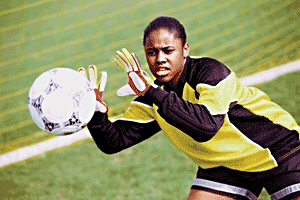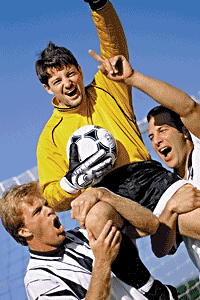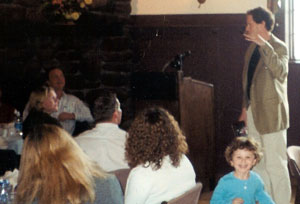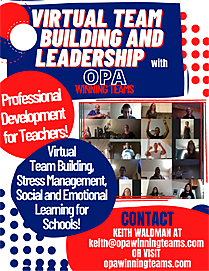Athletes at all levels face injuries. Whether these injuries are minor bumps, bruises or serious  injuries that prevent an athlete from participating in her sport, the process of recovery can be psychologically devastating. Having a sports injury (serious knee injuries) was the significant event in my life that initially led to my journey into field the of sport psychology. At that time I had 6 knee surgeries in five years and I went through a very difficult recovery process after surgery number 6. The goal of this article is to help create an understanding into the psychology of injury and tips on how to best cope with injury.
injuries that prevent an athlete from participating in her sport, the process of recovery can be psychologically devastating. Having a sports injury (serious knee injuries) was the significant event in my life that initially led to my journey into field the of sport psychology. At that time I had 6 knee surgeries in five years and I went through a very difficult recovery process after surgery number 6. The goal of this article is to help create an understanding into the psychology of injury and tips on how to best cope with injury.
There are many factors affecting the athlete’s injury experience, including severity of injury, extent of sport participation, and the personality of the athlete. I have found from both personal and professional experience that many athletes, including coaches and weekend warriors can have a high level of athletic identity. Athletic identity is when an individual’s emotional well-being is significantly dependent on sport or exercise. People with athletic identity derive a significant amount of self-esteem and personal competence from their ability to perform on the athletic field or in the gym. Athletes with high athletic identity who experience a serious or career ending injury may experience a grieving process. He or she may undergo a wide variety of reactions such as shock, denial, emotional isolation, anger, anxiety, and depression.
 One of the biggest issues that I hear from working with injured athletes is that they feel very isolated and they believe they are unable to contribute to the team’s success because of being less involved with their teammates. It’s common for athletes to struggle with feelings of guilt because they feel like they have let their teammates and coaches down. Due to the lack of practice and participation with the team, boredom and a lack of social interaction is another challenge facing the injured athlete. Another important issue that many injured athletes face is a blow to self-esteem and feeling less confident when returning to the athletic field.
One of the biggest issues that I hear from working with injured athletes is that they feel very isolated and they believe they are unable to contribute to the team’s success because of being less involved with their teammates. It’s common for athletes to struggle with feelings of guilt because they feel like they have let their teammates and coaches down. Due to the lack of practice and participation with the team, boredom and a lack of social interaction is another challenge facing the injured athlete. Another important issue that many injured athletes face is a blow to self-esteem and feeling less confident when returning to the athletic field.
When I was recovering from a total of eight knee surgeries I frequently struggled with feelings of depression, anger, frustration, boredom, and isolation. Although my college playing days were over, the majority of my free time was still spent competing on the basketball court with my friends and as a result of my injury I no longer had 2-4 hours per day with my social network. During this void, I initially found myself spending too much time watching television, playing video games, and eating way too much food. Periodically, I would go to the gym to say hello but I found this mentally stressful because it was a painful reminder of what I was missing. In addition, I struggled with my self-confidence upon my return to my sport. If you are currently experiencing an injury or have an athlete on your team who is struggling with an injury here are some warning signs of a poor adjustment to the injury:
- Easily irritated and/or frequent anger outbursts
- Ongoing feelings of sadness & emptiness
- Rapid mood swings
- Loss of energy and change of sleeping pattern
- Mentally preoccupied with the injury
- Frequently minimizing or denial about the injury. This is reflected by remarks like “Things are great,” “This injury is no big deal,”
- Excessive feelings of guilt that is reflected by obsessional thoughts about letting the team down.
- Using drugs or alcohol to cope with injury.
- Frequent negative self-talk about self
- Dependence on the athletic trainer
- Staying away from friends & family
- Apathy towards school, classes, or work
Tips on staying on top of the mental game during an Injury:
- Make friends with your injury. Make an effort to educate yourself about the injury, the rehabilitation process, and what the injury means to you. It is hard to give optimal effort into something you do not understand.
- Don’t be afraid to express your feelings. Avoiding the reality of one’s feelings and situation isn’t a great coping style in general. This is especially the case when athletes are injured; avoidant coping styles (ignoring feelings and trying to distract oneself from facing unwanted realities) have been found to be maladaptive and are not beneficial when dealing with injury. Expressing feelings is a healthy way of coping with an injury. You can discuss your feelings with close friends, family member, athletic trainer, coach, or a sport psychologist. Keeping a journal is a great way to express ones thoughts and feelings.
- Set short and long-term goals that monitor progress and recovery. Just because an athlete is injured doesn’t mean he/she has to stop planning or setting goals. Injured athletes can set goals that focus on ways of coping with the psychological challenges of injury, such as boredom, frustration, and feeling down. In addition you can set goals during your rehab in the training room. By monitoring the targeted goals he/she will also be able to notice small improvements in the rehab of the injury. As a result the athlete will feel more confident that he/she is getting better and improving. The athlete should work closely with both the trainer and doctor. They can help set realistic goals that are in line with each stage of the rehab process.
- Use your imagination. Visualize yourself successfully completing your rehab program. You can also mentally rehearse playing your sport to keep your skills and strategies sharp. Learn stress management, relaxation, and visualization techniques
- Stay Positive & Challenge your negative self-talk. Having a positive attitude is a key element to a successful recovery. Self-defeating/pessimistic thoughts will create a negative emotional state that will hinder your recovery. In addition, stressful thoughts may contribute to re-injury. Think of negative thoughts as junk food for your mind. To reach your optimal performance in the training room give yourself a steady diet of positive thoughts. Work towards replacing your negative thoughts with positive ones. For example you can change “I will never heal” to “I’ve made some progress and if I keep working hard full range of motion and quad strength will return. It is very easy to dwell on the negative aspect of the injury and focus on what you don’t have. Attitude is a Choice! Also, upon your return to sport remember to focus on what you have not on what you don’t have. If you are 70% focus on the 70% that you have not on the 30% of what you don’t have.
- Turn negatives into positives. If you are struggling with an injury you must look for opportunities to your enhance physical and mental preparation so you will come back to your sport stronger. For instance if you tore the ACL in your knee you can strengthen your upper body by lifting weights or if you are a basketball player who broke his/her shooting hand you can work on shooting with the other hand. This will make you a stronger player when you return to your sport.
- Stay involved with the team. Sometimes injured athletes will isolate themselves from the team because they feel they are letting the team down or because they are feeling depressed and/or stressed. Just because he/she is injured does not mean they cannot contribute to the success of the team. The injured athlete can redefine their role by assuming other team responsibilities, such as charting, scouting, giving feedback to teammates during games, give coaching tips to younger players, and helping out with drills.
- Get Support. A common response after an injury is to isolate themselves from teammates, coaches, and friends. It is important for the injured athlete to maintain contact with others as you recover from your injury. If possible, have your player use buddy system during your rehabilitation process. Again, support is one of the keys of overcoming an injury. Just knowing you don’t have to face the injury alone can also be a tremendous comfort.
- If necessary seek out a counselor that specializes in injury. If an athlete is really depressed for an extended period of time, have lost interest in things that use to excite them, have a change in sleep and eating patterns have changed, or have expressed suicidal thoughts, have the athlete seek professional help. Seeking out the help of a professional counselor is not a sign of weakness. On the contrary, it’s a sign of strength.
- Remember the P’s on Injury: Persistence, Perseverance, & Patience.
Final Word
What I have learned from both my personal and professional experience is that injured athletes are bound to have some down moments when coping with sports injury. There are many peaks and valleys in the process. It is possible to experience setbacks during the rehabilitation process, but the key to overcoming them is to acknowledge the setback for what it is (just a setback). Try not to internalize the negative emotions and find a way to stay positive. This is where social support and positive self-talk are extremely important. After releasing the negative emotions you can get back to focusing on the positives. Sometimes you have to fake it to make it!
Lastly, I cannot over emphasize enough the importance of turning a negative event(s) into a positive experience. Although the experience of facing my athletic injuries was quite distressing, I came to the realization that if it wasn’t for the adversity of my multiple knee surgeries, I have would not have felt so passionate about pursuing a career in sport psychology and working as a team building/sport psychology consultant. Having to undergo a very difficult recovery process first hand was intriguing and extremely eye opening. I would not have had the opportunity to make great connections with an abundance of wonderful coaches and athletes, or be in a position to make a positive impact on so many individuals/teams. It is vital to remember that injury is a bump on a long journey and that with a positive mind set, you will be able to turn difficult circumstances into an overall positive life experience.
Keith Waldman Bio: For over 15 years Mr. Keith Waldman has been a partner with Optimal  Performance Associates, LLC. Keith has been actively involved in a wide variety of athletic programs, K-12 schools, and corporations focusing on teambuilding, leadership, and athletic excellence. Keith has been a popular NCAA speaker for many collegiate and high school athletic programs and conferences. He has conducted hundreds of workshops for Division I-III sport teams and high athletic departments across the nation, including State, Conference, and National Championship Teams. Keith has been actively involved with the NFHCA. He has conducted team building, leadership, & mental toughness workshops for hundreds of high school and college field hockey teams. Keith has frequently written articles in the NFHCA Newsletter, and has been a popular presenter at the NFHCA Convention. His passion and commitment as well as his educational and professional experience have enabled Keith to make a tremendous impact on many athletic, educational, and corporate teams. To get more information about our team building, leadership, and mental toughness workshops you can visit the OPA website at www.opawinningteams.com or you can email Keith Waldman at keith@opawinningteams.com.
Performance Associates, LLC. Keith has been actively involved in a wide variety of athletic programs, K-12 schools, and corporations focusing on teambuilding, leadership, and athletic excellence. Keith has been a popular NCAA speaker for many collegiate and high school athletic programs and conferences. He has conducted hundreds of workshops for Division I-III sport teams and high athletic departments across the nation, including State, Conference, and National Championship Teams. Keith has been actively involved with the NFHCA. He has conducted team building, leadership, & mental toughness workshops for hundreds of high school and college field hockey teams. Keith has frequently written articles in the NFHCA Newsletter, and has been a popular presenter at the NFHCA Convention. His passion and commitment as well as his educational and professional experience have enabled Keith to make a tremendous impact on many athletic, educational, and corporate teams. To get more information about our team building, leadership, and mental toughness workshops you can visit the OPA website at www.opawinningteams.com or you can email Keith Waldman at keith@opawinningteams.com.



